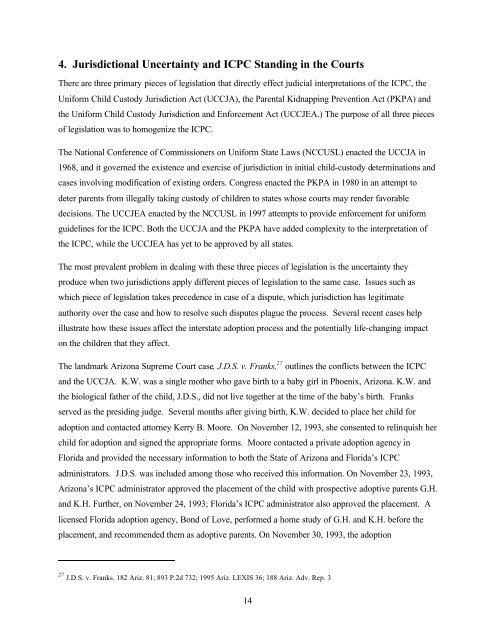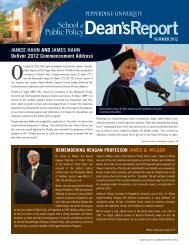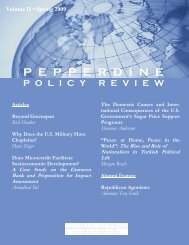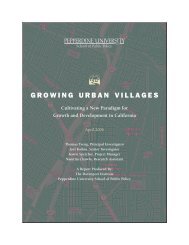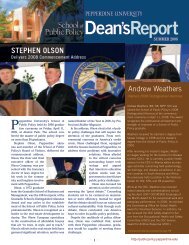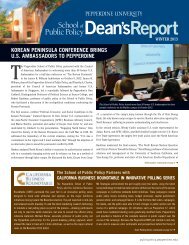Finding Permanent Homes for Adoptable Children - Pepperdine ...
Finding Permanent Homes for Adoptable Children - Pepperdine ...
Finding Permanent Homes for Adoptable Children - Pepperdine ...
You also want an ePaper? Increase the reach of your titles
YUMPU automatically turns print PDFs into web optimized ePapers that Google loves.
4. Jurisdictional Uncertainty and ICPC Standing in the Courts<br />
There are three primary pieces of legislation that directly effect judicial interpretations of the ICPC, the<br />
Uni<strong>for</strong>m Child Custody Jurisdiction Act (UCCJA), the Parental Kidnapping Prevention Act (PKPA) and<br />
the Uni<strong>for</strong>m Child Custody Jurisdiction and En<strong>for</strong>cement Act (UCCJEA.) The purpose of all three pieces<br />
of legislation was to homogenize the ICPC.<br />
The National Conference of Commissioners on Uni<strong>for</strong>m State Laws (NCCUSL) enacted the UCCJA in<br />
1968, and it governed the existence and exercise of jurisdiction in initial child-custody determinations and<br />
cases involving modification of existing orders. Congress enacted the PKPA in 1980 in an attempt to<br />
deter parents from illegally taking custody of children to states whose courts may render favorable<br />
decisions. The UCCJEA enacted by the NCCUSL in 1997 attempts to provide en<strong>for</strong>cement <strong>for</strong> uni<strong>for</strong>m<br />
guidelines <strong>for</strong> the ICPC. Both the UCCJA and the PKPA have added complexity to the interpretation of<br />
the ICPC, while the UCCJEA has yet to be approved by all states.<br />
The most prevalent problem in dealing with these three pieces of legislation is the uncertainty they<br />
produce when two jurisdictions apply different pieces of legislation to the same case. Issues such as<br />
which piece of legislation takes precedence in case of a dispute, which jurisdiction has legitimate<br />
authority over the case and how to resolve such disputes plague the process. Several recent cases help<br />
illustrate how these issues affect the interstate adoption process and the potentially life-changing impact<br />
on the children that they affect.<br />
The landmark Arizona Supreme Court case, J.D.S. v. Franks, 27 outlines the conflicts between the ICPC<br />
and the UCCJA. K.W. was a single mother who gave birth to a baby girl in Phoenix, Arizona. K.W. and<br />
the biological father of the child, J.D.S., did not live together at the time of the baby’s birth. Franks<br />
served as the presiding judge. Several months after giving birth, K.W. decided to place her child <strong>for</strong><br />
adoption and contacted attorney Kerry B. Moore. On November 12, 1993, she consented to relinquish her<br />
child <strong>for</strong> adoption and signed the appropriate <strong>for</strong>ms. Moore contacted a private adoption agency in<br />
Florida and provided the necessary in<strong>for</strong>mation to both the State of Arizona and Florida’s ICPC<br />
administrators. J.D.S. was included among those who received this in<strong>for</strong>mation. On November 23, 1993,<br />
Arizona’s ICPC administrator approved the placement of the child with prospective adoptive parents G.H.<br />
and K.H. Further, on November 24, 1993; Florida’s ICPC administrator also approved the placement. A<br />
licensed Florida adoption agency, Bond of Love, per<strong>for</strong>med a home study of G.H. and K.H. be<strong>for</strong>e the<br />
placement, and recommended them as adoptive parents. On November 30, 1993, the adoption<br />
27 J.D.S. v. Franks. 182 Ariz. 81; 893 P.2d 732; 1995 Ariz. LEXIS 36; 188 Ariz. Adv. Rep. 3<br />
14


